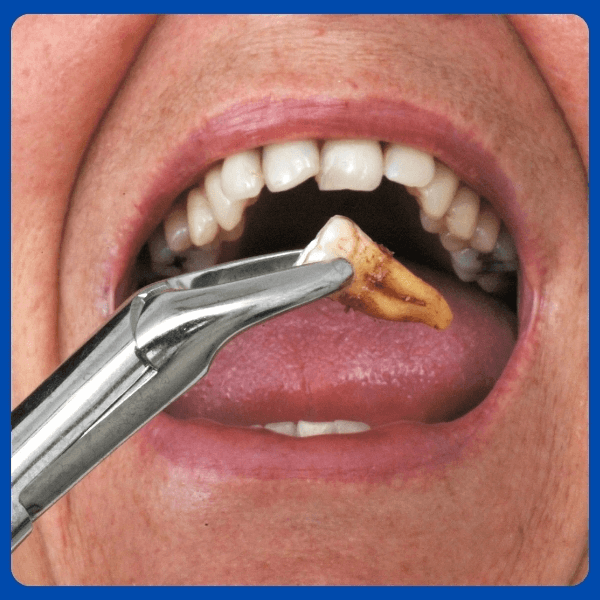
Tooth Extraction in Dubai – When Is It Necessary?
Tooth extraction is usually a quick outpatient procedure performed by dentists or oral surgeons. The affected tooth is numbed to ensure the process is painless. Sometimes, a root canal treatment may be done alongside the extraction. When a tooth is severely damaged due to neglect, saving it might not be possible, highlighting the importance of keeping your natural teeth healthy. For professional tooth extraction treatment in Dubai, book your consultation with Dr. Indraniil Roy for expert care.
When Is Tooth Extraction Necessary?
At Dr. Indraniil Roy’s Clinic, we prioritize saving natural teeth whenever possible. However, there are cases where extraction is the best course of action. You may need tooth extraction in Dubai if you have:
- Severe tooth decay: When cavities extend deep into the tooth, making restoration impossible.
- Fractured tooth: A break that reaches the root may require removal.
- Impacted tooth: Common in wisdom teeth that fail to erupt properly.
- Overcrowded teeth: Extraction may be necessary to create space for orthodontic treatment.
- Severe gum disease: Advanced periodontal disease can loosen teeth beyond repair.
- Dental injuries: Trauma that causes luxation or fractures may require removal.
Tooth Extraction Procedure
- Assessment and Planning
First, dental X-rays of the patient’s wisdom teeth are reviewed carefully, and an appropriate treatment plan is developed. - Administration of Anesthesia
Next, the oral surgeon administers anesthesia near the extraction site to numb the area and ensure comfort during the procedure. - Tooth Extraction
The dentist gently loosens the tooth from the gum using a dental instrument called an elevator. Then, forceps are used to carefully remove the tooth. - Incision and Removal (for Impacted Wisdom Teeth)
For impacted wisdom teeth, a small incision is made in the gum to expose the tooth and surrounding bone. The surgeon then removes the impacted teeth that are blocking the root. - Wound Care and Closure
After extraction, the area is cleaned thoroughly. The incision is sutured to promote healing, and gauze is placed over the site to help control bleeding.
What Are the Benefits of Tooth Extraction?
Having a tooth removed provides several advantages. Most importantly, it eliminates harmful bacteria that could lead to further damage to your teeth and gums. If left untreated, a decayed or damaged tooth can create a chain reaction of dental issues, affecting your overall oral health. Extracting the problematic tooth helps prevent these complications and promotes a healthier smile. Additionally, if the tooth is severely broken or infected, removal can provide almost instant relief from pain and discomfort.
Possible Side Effects of Tooth Extraction
Undergoing a tooth extraction is a routine procedure, but it may come with temporary side effects, including:
- Bleeding: Mild bleeding is expected after the procedure but should gradually subside.
- Swelling: Some swelling around the extraction site is normal and usually peaks within the first 24 hours.
- Discomfort: You may experience soreness or mild pain, which can be managed with prescribed or over-the-counter pain relievers.
Recovery After Tooth Extraction
How long does it take to recover?
- Most people feel normal within a few days.
- Routine activities can resume in 48 to 72 hours.
- Complete healing of the jawbone may take a few weeks.
- If getting a dental implant, you may need to wait a few months.
Tooth Extraction Aftercare
Dr. Indraniil Roy, Specialist Oral & Maxillofacial Surgeon & Implantologist in Dubai, recommends the following:
- Keep the area clean. Rinse gently with an antimicrobial mouthwash 2-3 times a day.
- Avoid brushing directly over the extraction site until advised.
- Take prescribed medications as directed, including antibiotics and pain relievers.
- Avoid strenuous activities for at least 48 hours to prevent bleeding and discomfort.
What to Eat After a Tooth Extraction
- Soft foods: Rice, pasta, eggs, yogurt, applesauce, mashed potatoes.
- Avoid hard, crunchy foods.
- Do not drink through a straw (prevents dry socket).
Returning to Work or School
- Most people can return within 1-2 days.
- If your job involves heavy lifting, you may need extra rest.
When to Call Your Dentist
- Fever of 100.4°F (38°C) or higher.
- Severe pain that doesn’t improve with medication.
- Pus or drainage around the extraction site.
For a safe and smooth tooth extraction, consult Dr. Indraniil Roy for expert care and aftercare support.
Tooth Extraction Treatment – FAQs
1. Are tooth extraction treatments painful in general?
No, tooth extraction is generally not painful. Dentists ensure patient comfort by using local or general anesthesia, depending on the complexity of the case.
2. Is it mandatory to get my affected tooth extracted?
Tooth extraction is not always mandatory. However, it is often recommended when wisdom teeth erupt improperly, causing crowding, misalignment, or discomfort. Left untreated, this can lead to pain, infection, or loss of function.
3. Can impacted teeth affect overall health?
Yes, impacted teeth can lead to gum infections, jaw pain, swelling, and even damage to surrounding teeth. In some cases, they may contribute to systemic issues if infections spread.
4. Which is easier to extract—upper or lower teeth?
Upper teeth are generally easier to extract because of their positioning and root structure. Lower molars often have stronger, curved roots that can make extraction more complex.
5. Which teeth are harder to extract?
Molars, especially those with long, curved, or multiple roots, can be more difficult to extract. Impacted wisdom teeth also fall under this category due to their location and alignment.
6. When should a tooth not be extracted?
If the tooth has only mild decay, cavities, or a minor infection, extraction is usually not required. These conditions are often treatable with fillings or root canal therapy.
7. Which tooth extractions are considered most painful?
Impacted wisdom teeth are often the most complex and uncomfortable to remove. This is because they may be lodged in the gum or jawbone, leading to post-extraction soreness.
Conclusion
Tooth extraction is an essential procedure to protect your oral health, especially when a tooth is severely decayed or damaged. Dr. Indraniil Roy, a leading oral and maxillofacial surgeon in Dubai, ensures a safe and comfortable extraction process with advanced techniques and personalized care. Following proper aftercare, such as maintaining oral hygiene, eating soft foods, and avoiding strenuous activities, can speed up recovery. If you experience severe pain, fever, or signs of infection, contact Dr. Indraniil Roy for expert guidance and post-extraction care.
Contact Us for More Information
If you’re struggling with dental discomfort, Dr. Indraniil Roy is here to help you regain comfort and improve your oral health. As a specialist oral & maxillofacial surgeon & implantologist in Dubai, Dr. Roy offers expert tooth extraction solutions tailored to address the root causes of dental issues. With personalized treatment plans, he ensures symptom relief and prevents further complications.
Take the first step toward a pain-free, healthier smile—schedule your consultation today!
Here are the contact details for Dr. Indraniil Roy:
Dr. Indraniil Roy looks forward to helping you achieve a more comfortable, functional, and confident smile!
